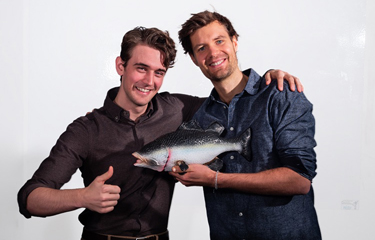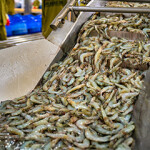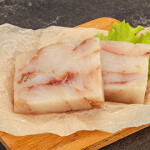Swedish start-up Hooked marketing vegan tuna and salmon imitation product in Europe

The origin of Stockholm, Sweden-based Hooked, traces back to a few years ago, when co-founder Tom Johansson’s sister decided to become a vegan.
“As a family we all grew up eating fish and seafood, and when my sister decided to become a vegan, she found that it was one of the things she really missed. She tried plant-based alternatives, but couldn’t find anything that matched up in terms of taste, texture, and especially nutrition, as many products were just starch- and water-based,” Johansson told SeafoodSource.
Johansson came up with the idea of trying to develop a vegan shrimp product with a friend, who put him in touch with Emil Wasteson, another food start-up entrepreneur. Over lunch, the pair hatched an ambitious plan to form a company they hoped would become the leading plant-based seafood company in Europe.
The new partners began by researching consumer concerns associated with traditional seafood production, and investigated the potential for selling vegan alternatives.
“We found so many issues linked to a growing demand for seafood, and realized how little we knew about fishing and aquaculture. They included sustainability, carbon footprint, feed, use of antibiotics, bycatch, escapes, heavy metals, and microplastics, to name just a few,” Wasteson said. “These are all things that people care about in their food, especially ethical consumers, who are seeking a harmless food system. On the plus side, we found great interest from potential buyers in a plant-based, healthy, sustainable and nutritious alternative.”
A year ago, they contacted a plant-based co-packing company in the Netherlands, eager to speak to food scientists, and were taken aback when their initial ideas for a plant-based recreation of a shrimp were laughed at. However, a brainstorming session soon elicited ideas that could be made ready for market more quickly.
“We decided to create a tuna product to start with, which is based on soy protein isolates, with the texture achieved through a wet extrusion method. The end product is shredded, ready for use in poke bowls, salads, pasta dishes, and pies,” Johansson said.
Hooked shredded tuna is now in the final stages of development, with factory trials due to be finished around the end of June. The company already has 11 restaurant chains ready to undertake tastings, and the development team are keen to hear their feedback.
“We are planning to launch three-kilogram packs in food service to start with, then work our way into retail, but COVID-19 has changed people’s buying habits, so this has made us look more closely at opportunities through the retail sector. The time is right to put ready-to-eat products on the consumer market for vegans and flexitarians,” Wasteson said.
The shredded salmon product, which the Hooked team believe will be their hero product, is still under development at RISE, the Research Institute of Sweden, and the vegan shrimp has been placed on the back burner for now, until the first two products are selling well.
“Getting the flavor of the salmon right has been more tricky, and we have been experimenting with raw materials including seaweed and algae, and incorporated algal oil to provide omega-3 fatty acids and get the nutrition balance right,” Johansson said.
Johansson admitted that getting into the food sector can be hard, but finding a European co-packer willing to work with them to produce small quantities had made it possible.
The pair chose the brand name Hooked as a simple, fun idea that represents seafood, but also fits in with their aim to get customers hooked on the products.
“Assessments in the Netherlands have found our product to have a better taste profile than products already on the market and it is definitely superior in terms of nutrition,” Johansson said.
He and Wasteson put up the initial funds for the company, and entered a deal with the co-packer, whereby upfront development costs were waived in return for revenue once the product starts selling. They have also been joined by Peter Liu as an intern technical manager.
Hooked secured a loan from a Swedish government-back start-up platform, and joined a ProVeg 12-week incubator programme in Berlin, which included a small cash injection.
Start-up costs have been relatively low so far, with Wasteson working full-time on the project, and Johansson continuing his position with an American FMCG corporation. However, in order to finalize the salmon product, step up production of their tuna analog once it hits the market, and develop new ideas, the pair are actively looking for investment partners, and hope to close an investment round in the fall.
“We are on trend, we want to grow fast, develop a strong brand, and roll out to many customers, and we have lots of ideas for new products in the future,” Johansson said.
The traditional seafood industry has been slow to embrace plant-based seafood alternatives, which Forbes and the BBC have declared the “next big vegan meat trend,” According to a Lightspeed/Mintel poll for the BBC, interest in vegetarian and vegan products shows no sign of slowing down, with retail sales in the United Kingdom alone expected to increase to GBP 658 million (USD 818.2 million, EUR 727.1 million) by 2021.
Photo courtesy of Hooked






Share